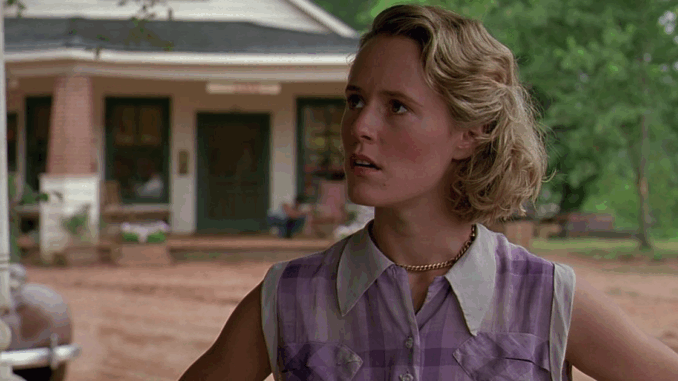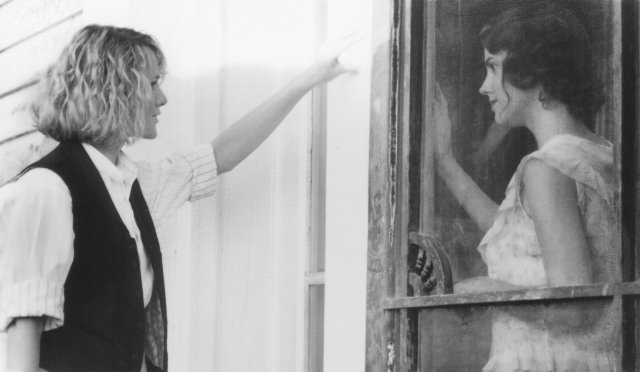
Some actors perform roles; others live them. Mary Stuart Masterson belongs to the latter. Her performances in Immediate Family (1989) and Fried Green Tomatoes (1991) didn’t just showcase her talent — they revealed her soul. In one film, she’s Lucy, a pregnant teenager facing the hardest decision of her life. In the other, she’s Idgie Threadgoode, a fearless Southern woman defying tradition and embracing freedom.
Let’s dive deep into how these two powerful performances helped shape Masterson’s legacy and why her portrayals continue to resonate today.
Early Life and the Birth of a Performer
Mary Stuart Masterson was born into a family of artists — her father was an actor and director, her mother a Broadway performer. From an early age, she learned that storytelling was more than performance; it was connection.
Growing up in this creative environment gave her an emotional intelligence that would later define her roles. She learned that acting wasn’t about pretending — it was about feeling.
“Immediate Family” (1989): The Role That Broke Hearts
Plot Overview
In Immediate Family, Masterson plays Lucy, a 17-year-old pregnant girl who agrees to let a married couple adopt her baby. But as her due date nears, Lucy begins to question whether she can give up her child.
The story explores motherhood, choice, and emotional complexity — and Masterson brings it to life with breathtaking honesty.
Lucy’s Vulnerability
Lucy isn’t just a scared teenager. She’s strong in her own way — resilient, tender, and unsure of how much of herself she can give away. Masterson perfectly captures that emotional tug-of-war between love and loss.
Her performance never feels forced. Instead, it’s subtle, authentic, and painfully human.
Critical Acclaim
Her portrayal of Lucy earned her immense praise and won her the National Board of Review Award for Best Supporting Actress. Critics and audiences alike were stunned by how she made a simple story so emotionally gripping.
Through Lucy, Masterson proved she could handle intense, layered drama — not just play a character, but embody one.
“Fried Green Tomatoes” (1991): The Role That Defined Her

Becoming Idgie Threadgoode
Two years later, Masterson took on a very different challenge: playing Idgie Threadgoode in Fried Green Tomatoes. Idgie is wild, independent, and fiercely loyal — a woman ahead of her time.
Set in the Deep South, the film tells the story of friendship, love, and resistance against societal norms. Idgie’s bond with Ruth Jamison (played by Mary-Louise Parker) forms the emotional center of the movie.
A Performance Full of Fire
Masterson’s Idgie is electric. She’s stubborn, bold, and endlessly compassionate. She’s the kind of person who’d stand up to anyone for the people she loves.
Her chemistry with Mary-Louise Parker brought warmth and depth to the screen, making their friendship one of the most beloved relationships in film history.
The Famous Bee Scene
One of the film’s most iconic moments shows Idgie fearlessly gathering honey from a hive of bees — with no stunt double. Masterson did it herself, letting real bees crawl over her. It became a powerful symbol of Idgie’s courage — and Masterson’s dedication to authenticity.
Two Roles, Two Worlds
| Aspect | Lucy – “Immediate Family” | Idgie – “Fried Green Tomatoes” |
|---|---|---|
| Nature | Vulnerable, introspective, scared | Bold, confident, free-spirited |
| Challenge | Facing the pain of giving up her baby | Defying gender and social expectations |
| Emotion | Heartbreak and doubt | Love, defiance, and loyalty |
| Theme | Motherhood and sacrifice | Friendship and independence |
| Legacy | Earned her critical acclaim | Made her a cultural icon |
These roles reveal the two sides of Masterson’s artistry — tenderness and strength, quiet emotion and fierce conviction.
A Study in Contrast
In Immediate Family, Masterson’s power lies in silence — the pauses, the unspoken heartbreak. In Fried Green Tomatoes, it’s the opposite — her strength bursts out in energy, laughter, and defiance.
Together, they form a portrait of a woman who could do it all. Vulnerability wasn’t her weakness — it was her superpower.
The Making of a Timeless Actress
Both films demanded courage. In Immediate Family, Masterson had to simulate pregnancy, connect with the deep emotions of motherhood, and portray the ache of separation. In Fried Green Tomatoes, she had to physically embody Idgie’s fearless nature — even when it meant facing real bees.
Her commitment was total. That’s why both roles still feel so alive decades later.
Themes That Connect Both Films
Despite their differences, Immediate Family and Fried Green Tomatoes share emotional DNA.
-
Motherhood and Care: Lucy wrestles with giving life; Idgie nurtures through love and protection.
-
Choice and Freedom: Both characters struggle to define themselves in a world that expects them to conform.
-
Empathy and Connection: Each woman learns that true strength often comes from compassion.
These universal themes explain why both films still resonate with audiences today.
Cultural and Feminist Impact
Masterson’s portrayals came at a time when Hollywood rarely gave women such complex roles. Lucy and Idgie weren’t defined by men; they defined themselves.
They challenged stereotypes — one through vulnerability, the other through rebellion — and became quiet icons of feminist storytelling.
Idgie, in particular, remains a symbol of authenticity and independence. Her story, though set in the past, still inspires modern viewers to live unapologetically.
Critical and Audience Response
Immediate Family received mixed reviews overall, but everyone agreed on one thing — Masterson was extraordinary. She elevated the film beyond its premise through emotional truth.
Fried Green Tomatoes became a box office and critical success, nominated for multiple awards and celebrated for its heartfelt storytelling. Audiences adored Idgie, and Masterson’s performance became one of her career highlights.
How These Roles Shaped Her Future
After these films, Mary Stuart Masterson continued to choose meaningful projects — from Benny & Joon to Bed of Roses. She didn’t chase fame; she followed substance.
Eventually, she stepped behind the camera to direct and produce, proving she was not just a performer but a storyteller in every sense of the word.
Why Mary Stuart Masterson Still Matters
In an age of fast fame and superficial stardom, Masterson reminds us what real acting looks like — commitment, vulnerability, and truth.
Her performances in Immediate Family and Fried Green Tomatoes aren’t just movie moments — they’re emotional experiences. They’ve stood the test of time because they came from a place of authenticity.
Conclusion
Mary Stuart Masterson’s journey from Lucy to Idgie reflects not just her growth as an actress but her depth as a human being. Through Lucy, she taught us about love, loss, and letting go. Through Idgie, she showed us courage, loyalty, and the power of living fearlessly.
Both roles continue to inspire — proof that when an actress performs with heart, the world remembers.
FAQs
1. What made Mary Stuart Masterson’s performance in “Immediate Family” so powerful?
Her raw vulnerability and ability to portray emotional turmoil with subtlety made Lucy unforgettable.
2. Why is Idgie Threadgoode considered one of Mary Stuart Masterson’s best roles?
Because Idgie’s strength, compassion, and rebellious spirit captured the essence of freedom and authenticity.
3. Did Mary Stuart Masterson perform her own stunts in “Fried Green Tomatoes”?
Yes, she performed the famous bee scene herself, handling live bees without a stunt double.
4. What awards did she receive for these performances?
She won the National Board of Review Award for Best Supporting Actress for Immediate Family and received wide acclaim for Fried Green Tomatoes.
5. What makes these roles timeless?
Their emotional truth, depth, and relatability — Lucy and Idgie speak to anyone who’s ever struggled to find strength in vulnerability.
